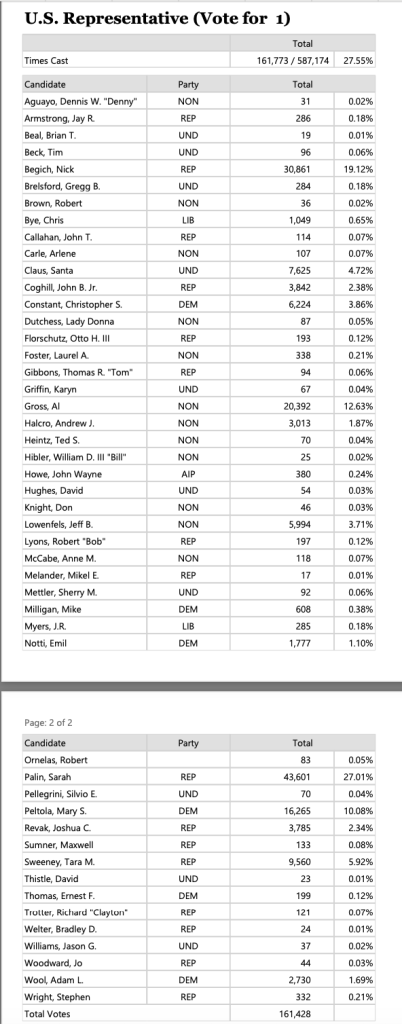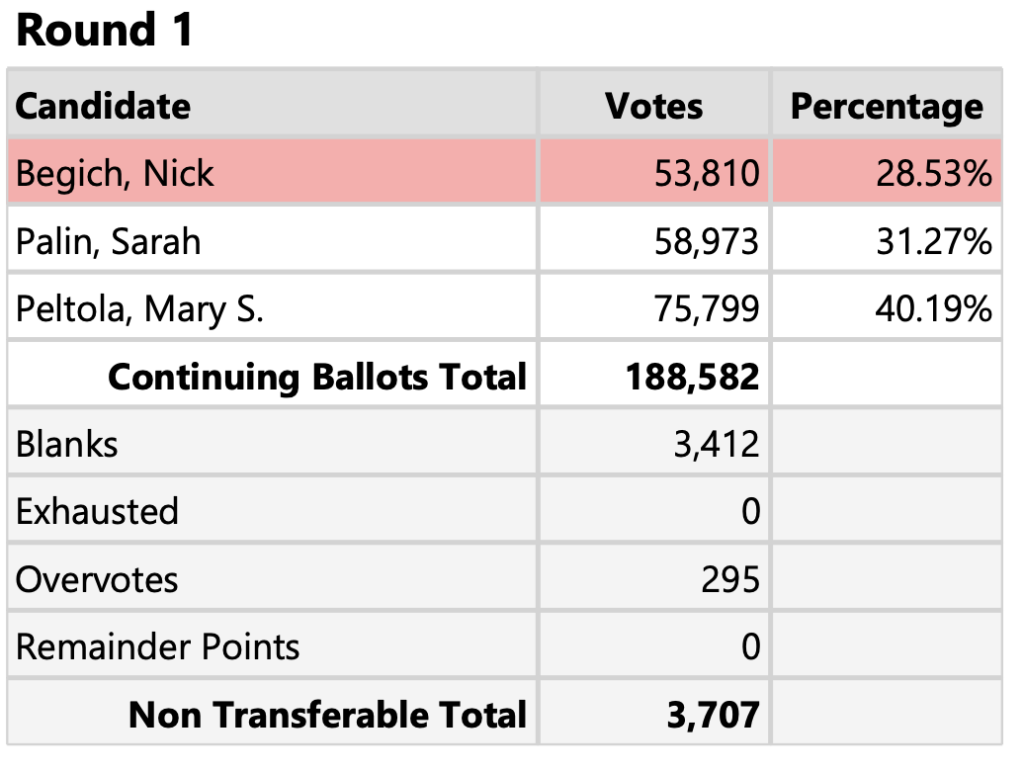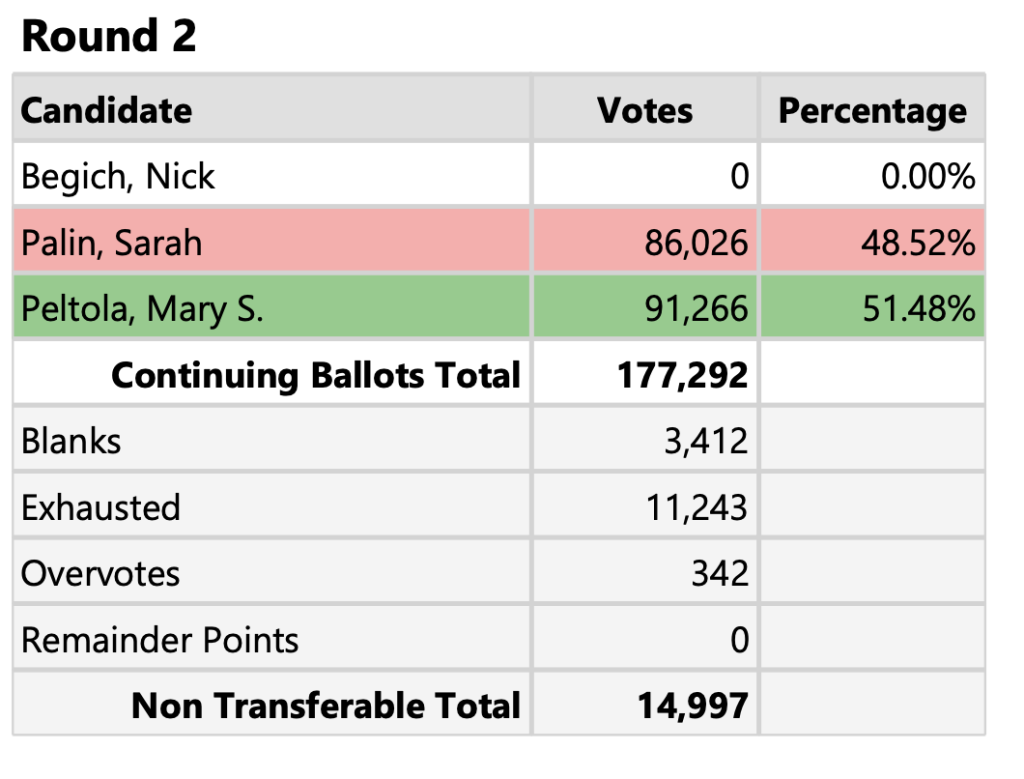Grossly Dishonest or Just Grossly Incorrect?
An FNC report on the Alaska House race is a mess.

When I saw this headline from Fox News, Alaska Republican drops out of three-way House race, dealing surprise blow to Democrats nationally, I had a feeling that the analysis was going to be off, but it was far worse than I expected.
The “surprise” news is that the third-place finisher in Alaska’s primary for the US House of Representatives is dropping out. We may all recall that Alaska adopted a Top Four system that employs Rank Choice Voting (i.e., an instant run-off) in the second round (i.e., the general election round). This was first deployed for the House in the 2022 special election for the seat that I discussed here: N=1 Means, Well, Not a Lot.
In what may be a surprise blow to Democrats’ chances of holding a key red state seat in the U.S. House, Alaska Lt. Gov. Nancy Dahlstrom announced Friday she is suspending her campaign for Congress.
Dahlstrom was in what was essentially a three-way race with incumbent Democratic Rep. Mary Peltola and Republican Nick Begich III, who comes from a prominent political family in The Last Frontier.
While Dahlstrom did not immediately endorse Begich, she suggested in comments announcing her withdrawal that her reason for running was to see Peltola defeated.
Soooo, this doesn’t change the math save that it means that a winner might be declared in the first round, and not after the first-round votes are reallocated. I can’t decide if the author flatly does not understand the system about which they are reporting or if they are just trying to write a pro-Republican, anti-Democrat story (or, indeed ¿por qué no los dos?).
I guess that the phrase “essentially a three-way race” means that the author just doesn’t understand the process. I mean, why “essentially”? But more to the point: Top Four (or any run-off system) will eventually reduce the number of competitors to two.
All Dahlstrom has done here is allow voters to rank choice Begic and Peltola without having to worry about how they rank her.
Here’s the deal: yes, if this were a plurality (i.e., a simple majority, or just the most votes) contest, Peltola would benefit from running against two Republicans because of the increased chances that they would split the opposition vote.
But, of course, Top Four is, as noted, a run-off system that reallocates second, third, etc. preferences to produce a candidate who has absolute majority support (i.e., at least 50%+1). It is essentially the same thing as run-off elections used in various parts of the country (such as for primaries in my state of Alabama or to elect members of Congress next door in Georgia) with the main difference being that this kind of run-off is instantaneous, as opposed to happening at two different times over the course of weeks. Voters rank their choices. While I know that it is not something Americans are used to, it truly is not that complicated.
And yet, we get this grossly incorrect statement:
Due to the state enacting ranked choice voting by popular vote in 2020, elections in Alaska now differ from most other states in that the candidate to gain the majority of the votes is not necessarily declared the winner.
This is where it feels a bit propaganda-y to me. It seems like the goal is to confuse people about the nature of the contest and to focus solely on the first round of voting and ignore that voters rank their choices and that there are subsequent rounds. For that matter, it is possible in any multi-round contest for the candidate who wins the most votes in the first round to go on and lose in the second round once it is a two-person race.
Further, the above clearly is confusing simple and absolute majorities. Because even in Top Four, if a candidate wins the absolute majority in the first round, they win outright.
The only charitable interpretation of this statement is that the author does not understand the difference between a simple majority and an absolute majority.
But really, more importantly, the following is a pure GOP attack line from the 2022 special election:
Though the two GOP candidates garnered more votes than Peltola, she was named the winner after the hierarchical rounds of ranked choice vote tallying concluded. Under the system, the lowest vote-getter is eliminated, and that candidate’s voters’ “second-choice” votes get tallied instead, and so on.
This is a crazy critique because it ignores the fact that if Alaska used the system most states use, plurality winner, then the sum total of the losers in the election is not the issue. If I win 40% and two candidates combine to win 60% (say 35% and 25%), I still win in a plurality contest. Of course, the only reason there were two Republicans and one Democrat and further why voters were willing to initially split their votes is because everyone knew that it was a multi-round process!
The funny thing about all of this is that with the exception of the primary stage of the 2022 special election primary, Peltola has won the plurality (or better) in four straight contests (2022 special election first round, 2022 general election primary, 2022 general election first round, and the 2024 primary).
In other words, it isn’t even as if Peltola was in third place and then managed to climb to first in these elections. With one exception, which was in an extremely crowded field in an inaugural process, she has been the most popular candidate in each election.
Let’s review.
The 2022 special election primary went as follows.

This led to Begich (30,861), Palin (43,601), Peltola (16,265), and Gross (20,392) qualifying for the second round. Gross dropped out. This was the first time such a primary was held under the Top Four system. It was Pelota’s worst showing in the mix.
The 2022 special election itself went as follows. Note that had this been a “normal” plurality election, Peltola would have won (although, yes, she wouldn’t have been running against two Reps).

It took only two rounds before Peltola won the absolute majority:

Full results here.
Here’s the 2022 general election first round. Here she is within spittin’ distance of an absolute majority in the first round.

It took three rounds and she ended up with 54.96% (full results here).
And here is this year’s primary result. Here she won 50.36% of the vote! Granted, this is a low-turnout primary. Nonetheless, the fact that Dahlstrom only was able to register 19.96% of the vote might explain why she dropped out.

Given that Alaska is a red state (voting 52.83% for Trump in 2020), it will be more difficult for Peltola to be re-elected. Still, it will have precious little to do with Dahlstrom dropping out. All that does is make it a two-way race between Peltola and Begich, and Peltola has beaten him several times already. There may be a third candidate (Salisbury) but their performance in the primary suggests to me that this current round of Top Four will end up being a two-person contest with a reallocation of the third-place votes being unneeded.
But back to the FNC coverage. In my view, it is a combination of failure to understand the process coupled with an editorial point-of-view that any reform that seems to help Democrats must be flawed.
And look, I am not a big fan of Top Four because the root problem is the usage of single-seat districts, not the lack of requiring absolute majority winners. Still, it is dishonest, and flatly poor journalism to not have an honest assessment of how the process works and, moreover, to simply see it through partisan lenses.
Update/Side Note: I know that it is early, but it is interesting to note how hard a time they are having getting to Top Four in the general.
They’re doing something fair and different that we can’t understand in a soundbite, nor easily game in our favor! Kill it!!1!!! Kill it!!1!!!
They are trying to make it sound like 2022 was a spoiler situation in which the only reason Peltola was able to win was because the Republican vote was split between two Republican candidates. This overlooks two points:
(1) In the second round, after Begich was eliminated, a significant number of voters who selected him for their first choice had Peltola as their second choice. Therefore, pointing to the combined total of the Republican vote in the first round doesn’t prove what the critics think it does, as not all those voters were voting based purely on the party ID of the candidates.
(2) In ranked choice, by definition voters know from the start that their second choice can matter, and that affects their decision on who to put in first place. Would all of those Begich-Peltola voters have simply voted for Begich in a traditional, single-choice system? We don’t know that. Their choice of first-place was influenced by their ability to choose more than one candidate. The notion that the first round necessarily represents what the final results would have been in a traditional, single-choice system is spurious.
Hanlon would say, “Never attribute to malice that which is adequately explained by stupidity.” But this is FOX, I vote both.
Since “fact checking” seems to be in the barrel this week, I saw a fairly prominent pundit say both FTFNYT and FOX could be fixed by fact checking. I read the FOX website, and perhaps they’re different on-air, but I don’t see a lot of lies. What I see is massive omission, obsessive spin, and focus on trivia. The story is never “Biden did X”, but “So and so criticizes Biden for X”. Simply checking facts won’t affect that sort of thing.
ETA – Editing!! Thanks. Good thing since Apple, in its infinite wisdom, had said “Hanson”.
@gVOR10: Once upon a time, when I learned about libel laws, I wondered how The National Enquirer could get away with some of the headlines they did. I read some of one copy my aunt had. (She read it every week, sigh.)
It is full of hedges like this, “So-and-so said Biden said X to her in private” or even “people are saying” (No, Trump didn’t invent that phrase, not at all. But the fact he uses it would probably make a positive impact on my dear-departed aunt.)
Alaskan voter here…I WAS GOP but switched to Undeclared (Independent is an established party in AK and not for me). Thanks for calling out Fox for headline funny business. We know that both sides do it, even the ‘good guys.’
Re: ranked choice…I cannot stand it. Clearly voters are confused in addition to being frustrated. What I understand is that GOP in AK was all about ranked choice when it was being considered because it would derail Murkowski’s challenger bid for her senate seat. In the end, the GOP fumbled continuing 49 years (what coincidence?) of GOP in that House seat and letting an unknown Democrat have it. So they apparently got bitten by their own snake in the grass (Keep in mind, there are no native snakes in AK, perhaps this explains it).
I hope ranked choice goes the way of the wooly mammoth. For now, not seeing reasons Peltola should be ousted for some eager Republican up and comers who can’t deliver on fundamentals in their current roles. Just read the NRA endorsed Peltola. She appears to be manifesting the very middle of the road, sensible, fair, AK centric political persona that MOST Alaskans want…which is likely why she’s been routinely carrying the vote in contests so far for the most part.
As of now, I’ll be voting for Peltola.
@Kylopod:
Bingo!
I think ranked choice makes sense, and the vote counting process seems simple to me, but I have talked with a lot of smart people who can’t wrap their heads around it. So is it good enough to have the ballot ask for your first, second, etc choice regardless of whether you understand how it works?
@Kylopod: This was kind of a “spoiler candidate” election, but not in the way that you describe.
The critics of ranked-choice voting who point to this specific election have a point. This election violated the Independence of Irrelevant Alternatives (IIA) axiom in Arrow’s Theorem. Namely, if you look at the actual ranked choice votes, Begich was preferred both to Peltola and Palin in two way comparisons. So, if IIA holds then he should have won against either without the introduction of the third. Morgenbesser’s description of this property illustrates the problem:
This occurred because Peltola and Palin had a disproportionate number of first or third preferences and Begich had the most second place preferences. Therefore, he was eliminated even though he was preferred by a majority to either Palin or Peltola. Either Peltola or Palin could be considered a “spoiler” in this instance. Palin is the correct spoiler designee, because she was eliminated and Peltola won.
This is not an impossible outcome, as Arrow’s Theorem demonstrates. It is impossible to have a voting system that eliminates this possibility without introducing some other potential undesirable outcomes.
This is not an indictment of ranked choice. An article who analyzed RC and pointed out the Alaska outcome also pointed out that this was the only RC election in the US for which they could collect data where this happened. It was an odd circumstance of the particular numbers in this election and should be a rare outcome for RC voting.
@Jay:
…and this is part of why I love this blog so much. I can’t geek out over axiomatized decision theory and argue descriptive vs. prescriptive in just any blog comment section.
I’m from Australia, land of ranked choice voting. And all i can say is THANK YOU, STEVEN! HALLELUJAH!
Americans’ inability to understand the fairly basic system that is ranked choice voting is doing my head in! It seems like such a no-brainer that you guys should generally take it up, but the confusion and disinformation being spread by some outlets about it is making me despair. You are doing God’s work, Steven Taylor!